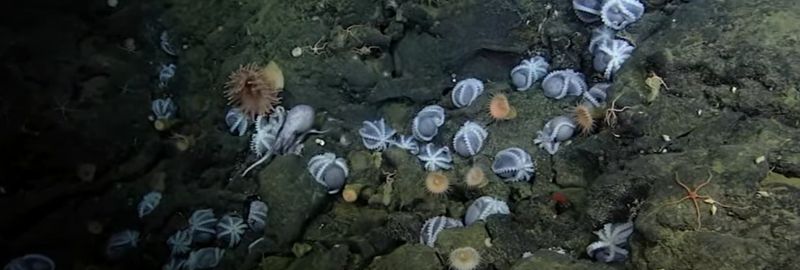 Richard Starkey, better known as Ringo Star, wrote the song, Octopus’s Garden, for the Beatles 1969 album Abbey Road. The first verse goes:
Richard Starkey, better known as Ringo Star, wrote the song, Octopus’s Garden, for the Beatles 1969 album Abbey Road. The first verse goes:
I’d like to be/Under the sea/In an octopus’ garden/In the shade…
In a recent study, researchers describe finding an octopus’s garden beneath the sea about 80 miles from the coast of central California. It is believed to be the largest congregation of deep-sea octopuses ever discovered on Earth, where over 6,000, and possibly as many as 20,000, octopuses huddle around an extinct underwater volcano in the black, cold ocean depths, almost two miles below the surface.
The aggregation of octopus was discovered in 2018 and has remained something of a mystery. Octopuses are generally antisocial loners that would rather fight each other than live in close quarters.
For three years, the team monitored the population through cameras and dives with remotely operated vehicles, measuring water temperature and oxygen. They found only adult males and female octopus, developing eggs, and hatchlings at the location, indicating the site was used exclusively for mating and nesting, as reported by the Washington Post.
They also noticed shimmering water, which was indicative of a thermal spring — something “totally new in this area,” Jim Barry, senior scientist at the Monterey Bay Aquarium Research Institute and lead author of the new study, said. He explained the shimmering water appears when warm water (such as from a thermal spring) and cool waters mix. Water temperature from these thermal springs can reach nearly 51 degrees Fahrenheit, while ambient water temperature is around 35 degrees. The warm water is only bathing a small area about a foot above the seabed, but scientists found many female octopuses brooding in the warm pool.
The team reasoned that the warmer water helps accelerate the development of the embryo, speeding up the metabolic processes. Typically at near-freezing temperatures in the deep ocean, researchers expected pearl octopus eggs at least five years to hatch. These hatched in just two years.
Researchers use underwater technology in Monterey Bay to unlock mysteries of rare octopus garden
